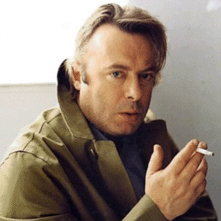April 13: Christopher Hitchens
Christopher Hitchens (1949)
It was on this date, April 13, 1949, that British-born American journalist Christopher Hitchens was born in Portsmouth, England. Hitchens made his mark as a writer for Vanity Fair and The Nation magazines, and with his irascible personality and prodigious indulgence in spirits (the liquid kind). He has admitted admiration for and influence from such notables as George Orwell, Thomas Paine, and Thomas Jefferson. Initially a darling of the Left, Hitchens moderated his views after the fatwa requiring Muslims to murder writer Salman Rushdie and the Muslim terrorist attacks on the US on 9/11/01 – he emigrated in 1981 and has been a US citizen since 2007.
His bonafides as not only an atheist, but an “antitheist” are solid. Free Inquiry magazine interviewed Hitchens in the Fall 1996 issue. In it, Hitchens says, "I'm an atheist. I'm not neutral about religion, I'm hostile to it. I think it is a positively bad idea, not just a false one. And I mean not just organized religion, but religious belief itself."
In a 1995 book called The Missionary Position: Mother Theresa in Theory and Practice Hitchens debunks the uncritical sanctification of Mother Theresa. In a summation published in Slate (Oct. 20, 2003), Hitchens says, unequivocally, “She was a fanatic, a fundamentalist, and a fraud, and a church that officially protects those who violate the innocent has given us another clear sign of where it truly stands on moral and ethical questions.”
Profiled in the Washington Post on February 12, 1999, in the context of what he characterizes as absurd airline security procedures — having to show your ID, as if terrorists wouldn't forge those first of all — Hitchens added, "In addition to being a socialist and an atheist, I'm a libertarian."
Although never reticent in his criticism of Christianity, and of religion in general, in his 2007 book, God Is Not Great: How Religion Poisons Everything (UK title God Is Not Great: The Case Against Religion), Hitchens described organized religion as “violent, irrational, intolerant, allied to racism, tribalism, and bigotry, invested in ignorance and hostile to free inquiry, contemptuous of women and coercive toward children.” Having the courage of his convictions, in February 2006, Hitchens helped organize a rally outside the Danish Embassy in Washington, DC, in support of free speech, following the Jyllands-Posten Muhammad cartoons controversy.
In June 2010, Hitchens postponed a book tour for his autobiography, Hitch-22, to undergo treatment for esophageal cancer and admits that he would be a "very lucky person to live another five years." Hitchens died on 15 December 2011 at 62. Asked if his serious illness has affected his view of the afterlife, which he has always denied, Hitchens replied at length in a panel discussion that included atheist author Sam Harris (The End of Faith, 2004; Letter to a Christian Nation, 2006),
I would say it fractionally increases my contempt for the false consolation of religion and my dislike for the dictatorial and totalitarian part of it. I presume what I say by the first is self-evident. What I mean by the second is, it’s considered perfectly normal in this society to approach dying people who you don’t know, but who are unbelievers, and say, "Now are you going to change your mind?" In fact, it’s considered almost a polite question.
As you know, there’s a long history of fraud about this. People claim that Darwin had a deathbed recantation, they’ve made up lies about Thomas Paine. It goes on all the time. It’s a very nasty little history. But there’s also a horrible undertone of blackmail to it. People write and say, "Look, you’ve got about one chance left now. Aren’t you going to take it? I’m writing to you as a friend."
They’ve even tried it on me when I’ve been very ill, and didn’t have quite the vinegar I’d like to have had, in a hospital bed. I don’t mind. I can take it. But I think there are a lot of people older than myself, iller than myself and, perhaps, at the risk of seeming conceited, less educated than myself, to whom that’s a horrible experience. It’s very depressing and alarming to be spoken to in that way.
I mean, if Sam [Harris] and I were to form a corps of people to go around religious hospitals, which is what happens in reverse, and say to people who are lying in pain, "Did you say you were Catholic?" "Yes." "Well, look, you may only have a few days left, but you don’t have to live them as a serf, you know. Just recognize that that was all bullshit, that the priests have been cheating you, and I guarantee you you’ll feel better."
I don’t think that would be very ethical. I think it would be something of a breach of taste. But if it’s in the name of God, it has a social license. Well "fuck that," is what I say. And will say if it’s my last breath.
Originally published April 2011 by Ronald Bruce Meyer.


